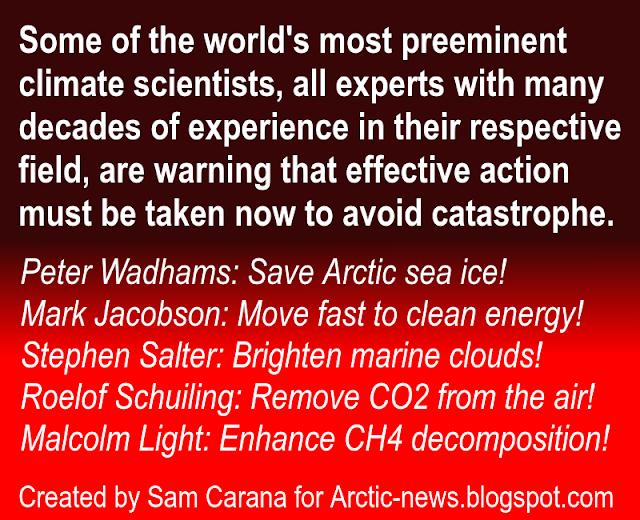Some of the world's most preeminent climate scientists, all experts with many decades of experience in their respective field, are warning that effective action must be taken now to avoid catastrophe.
These scientists, and many others, have made valuable and much-appreciated contributions to the Arctic-news blog over the years [note: contributors each express their own views in posts and may or may not endorse other content of this blog].
Sam Carana, editor of this blog, has for years supported the calls of these scientists, also discussing and sharing their calls at facebook groups such as Arctic-News, Electric Transport, Renewables and Climate Alert.
 |
| [ image discussed at facebook ] |
Furthermore, Sam Carana has called for specific action for years, including support for biochar, preferably through feebates. More specifically, Sam Carana recommends that revenues raised from fees imposed on sales of livestock products, nitrogen fertilizers and Portland cement are used to fund support for soil supplements, as illustrated by above image. For more on biochar, see this blog and this facebook group.
For years, Sam Carana has also called for more R&D in specific areas of geo-engineering. For more on this, see this blog and this facebook group.
More generally, Sam Carana advocates the Climate Plan, which calls for a global commitment to parallel lines of action while seeking to delegate implementation to local communities, preferably through effective policies such as local feebates.
 This blog has had some success in spreading this message. To date, Sam Carana has received 82,327,368 views at Google plus (see screenshot on the right), while this blog has received 3,255,445 views (see update of views in the panel further on the right).
This blog has had some success in spreading this message. To date, Sam Carana has received 82,327,368 views at Google plus (see screenshot on the right), while this blog has received 3,255,445 views (see update of views in the panel further on the right). Your continued support is needed to share this message, so please join one or more of the above-mentioned groups, and share and like the images of this post in emails, on facebook and other social media.
Regarding the urgency to act, the images below give an update on the terrifying situation in the Arctic, where the sea ice is disappearing fast.
The decline of the snow and ice cover in the Arctic goes hand in hand with rising sea surface temperatures that contribute to sea ice getting ever thinner.
The image on the right show Arctic sea ice on September 1, 2016, with thickness in meters.
The warming of the oceans is illustrated by the images below.
The image directly below shows sea surface temperature (left) and anomalies compared to 1981-2011 (right).
The image below also shows sea surface temperature anomalies, this time compared to 1971-2000.
Global warming has hit the Arctic particularly hard over the past 365 days, with anomalies exceeding the top end of the scale over most of the Arctic Ocean, as illustrated by the image below.
The situation is dire and calls for comprehensive and effective action as described at the Climate Plan.






11 comments:
effective action must be taken now to avoid catastrophe. YES
The arctic ice would likely be massively lower if not for shyly of overcast in the Arctic
I've been trying to figure out which sites have the most accurate data. http://web.nersc.no/WebData/arctic-roos.org/observation/ssmi_ice_ext.png That appears different compared to the chart you posted from NSIDC.org. It also looks worse. After the 5.0 earthquake 46km ENE of Olonkinbyen, Svalbard and Jan Mayen on the 3rd around 6:33 (UTC) I'm concerned about more methane being release from the seabed. It would be nice to have a better understanding on the scope of things before 'The chickens come home to roost'.
What will happen if all ice at the North pole melted?
Thanks Jeffrey
A temperature rise (from preindustrial levels) of more than 10°C (18°F) could eventuate by the year 2026, as illustrated by the image at this post and as also discussed in this post.
Especially, suppose in ten years the temperature has risen also ten degrees, how much would sealevel rise in those ten years? And how much in 15 years from now... Is there anyone that is Good at calculating? I mean this: supposedly Global Temp rise of 10C would mean about 15C rise in the arctic, doesn't it? So it would be interesting and important to know how much ice in Greenland and the Antarctic could have melted in just 10 or 15 years from now? Are there models that can calculate this with give parameter (i.e. plus 10C)? I live in the Netherlands, 20km from the Northsea. Our house lays 5.5m below sealevel... For Holland this is serious stuff if temperature rise would go that fast... Half of the Dutch population lived below sealevel now already (That's half of 17million people)... ��
I don't think there will be anyone left alive with a global temperature rise of 10 degrees Celsius (or 18 degrees Fahrenheit).
This is so sad,....I don't think people in General, here in the United States realize, or understand what a 10C spike in temperature over a short 10 year period would unleash. I've been doing personal research into the Droughts here in the Western U.S,becoming more frequent, extended. ..Low snow packs covering many if not most ranges,desperate wildlife, dying trees,people living without water in their homes, skyrocketing energy and food prices, and this in only the beginning. .
Yes, extinction in one decade.
The absolute thermodynamic nature of man under Midas Touch against Earth at Zeroth Law biosphere function relative to Earth maintaining habitable zone stability is a line god and the devil would not cross but bundled inc can and does by mixing politics-to-war to separate water from water-shed.
New comments are not allowed.